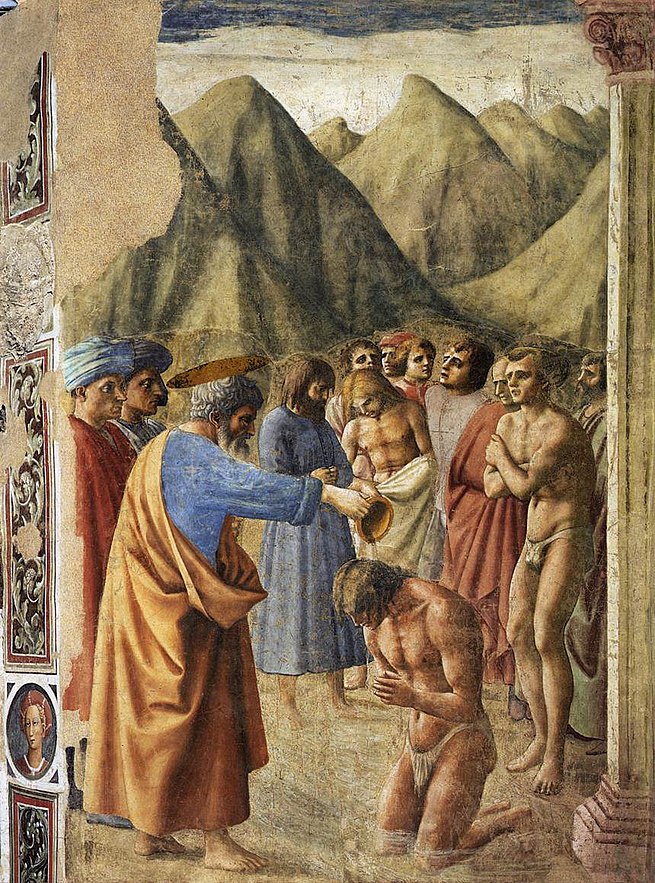-
Baptism
Baptism (from the Greek noun βάπτισμα baptisma; see below) is a Christian rite of admission and adoption, almost invariably with the use of water, into Christianity. The synoptic gospels recount that John the Baptist baptised Jesus. Baptism is considered a sacrament in most churches, and as an ordinance in others. Baptism is also called christening, although some reserve the word “christening” for the baptism of infants. It has also given its name to the Baptist churches and denominations.
The usual form of baptism among the earliest Christians involved the candidate’s immersion, either totally (submerged completely under the water) or partially (standing or kneeling in water while water was poured on him or her). John the Baptist’s use of a deep river for his baptising suggests immersion: The fact that he chose a permanent and deep river suggests that more than a token quantity of water was needed, and both the preposition ‘in’ (the Jordan) and the basic meaning of the verb ‘baptize’ probably indicate immersion. In v. 16, Matthew will speak of Jesus ‘coming up out of the water’. Phillip and the Eunuch also went down and came up out of water (Acts 8:38–39). Baptism is likened unto a burial in Romans 6:3. “Dip” is translated from baptō (βάπτω). The traditional depiction in Christian art of John the Baptist pouring water over Jesus’ head may therefore be based on later Christian practice. Pictorial and archaeological evidence of Christian baptism from the 3rd century onward indicates that a normal form was to have the candidate stand in water while water was poured over the upper body. Other common forms of baptism now in use include pouring water three times on the forehead, a method called affusion.
Martyrdom was identified early in Church history as “baptism by blood”, enabling the salvation of martyrs who had not been baptized by water. Later, the Catholic Church identified a baptism of desire, by which those preparing for baptism who die before actually receiving the sacrament are considered saved. As evidenced also in the common Christian practice of infant baptism, Christians universally regarded baptism as in some sense necessary for salvation, until Huldrych Zwingli (1484–1531) denied its necessity in the 16th century.Quakers and the Salvation Army do not practice baptism with water. Among denominations that practice baptism by water, differences occur in the manner and mode of baptizing and in the understanding of the significance of the rite. Most Christians baptize “in the name of the Father, and of the Son, and of the Holy Spirit” (following the Great Commission), but some baptize in Jesus’ name only. Much more than half of all Christians baptize infants; many others regard only believer’s baptism as true baptism.
The term “baptism” has also been used metaphorically to refer to any ceremony, trial, or experience by which a person is initiated, purified, or given a name.
-
Baptism (noun)
A Christian sacrament, by which one is received into a church and sometimes given a name, generally involving the candidate to be anointed with or submerged in water.
-
Baptism (noun)
A similar ceremony of initiation, purification or naming.
-
Christening (noun)
The Christian sacrament at which someone, usually a child, is baptized and given a Christian name.
-
Christening (noun)
Any instance of someone’s or something’s being christened.

